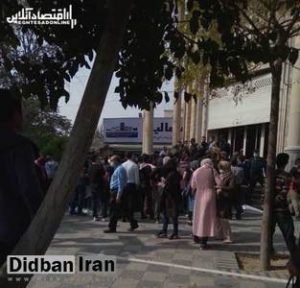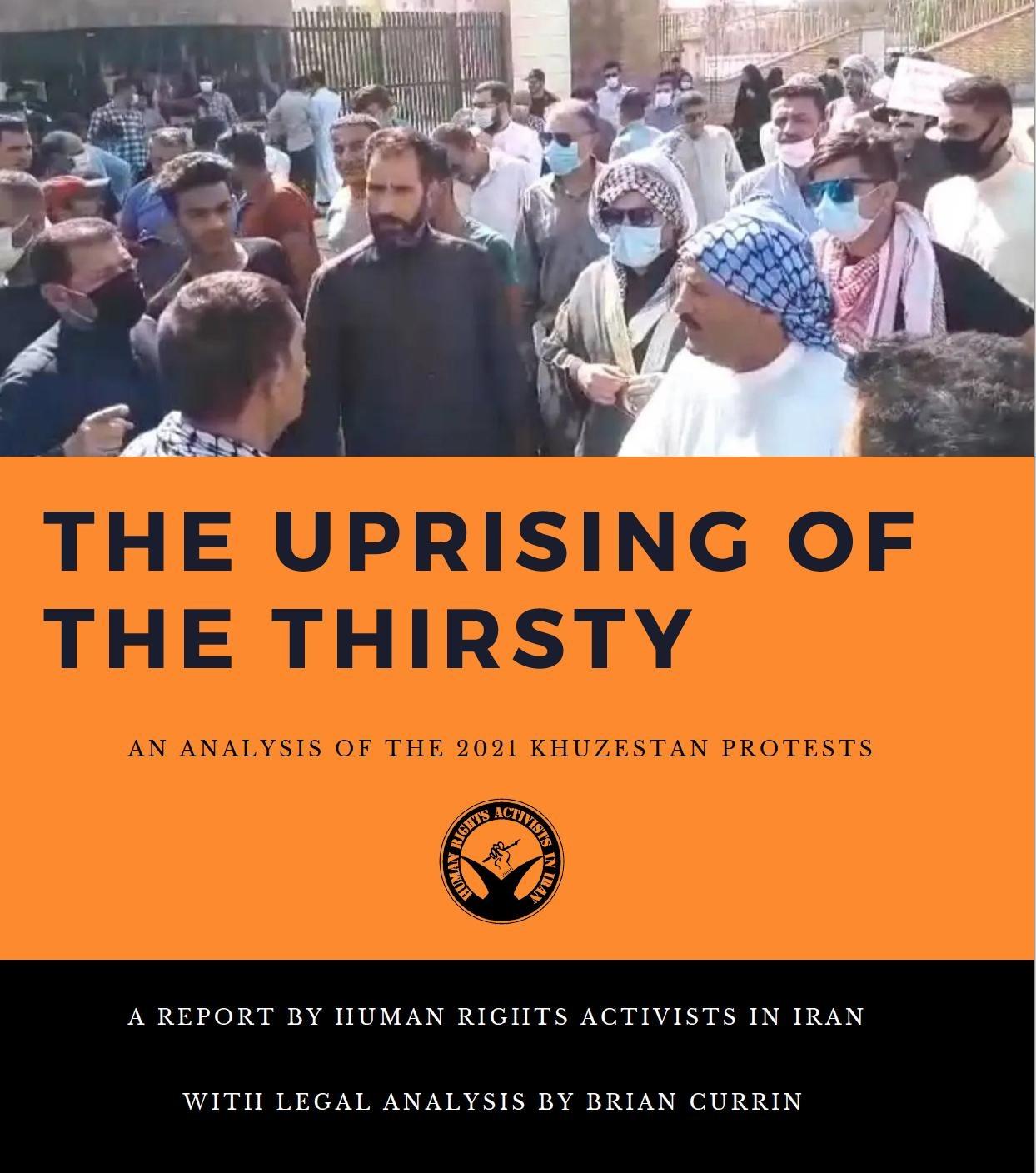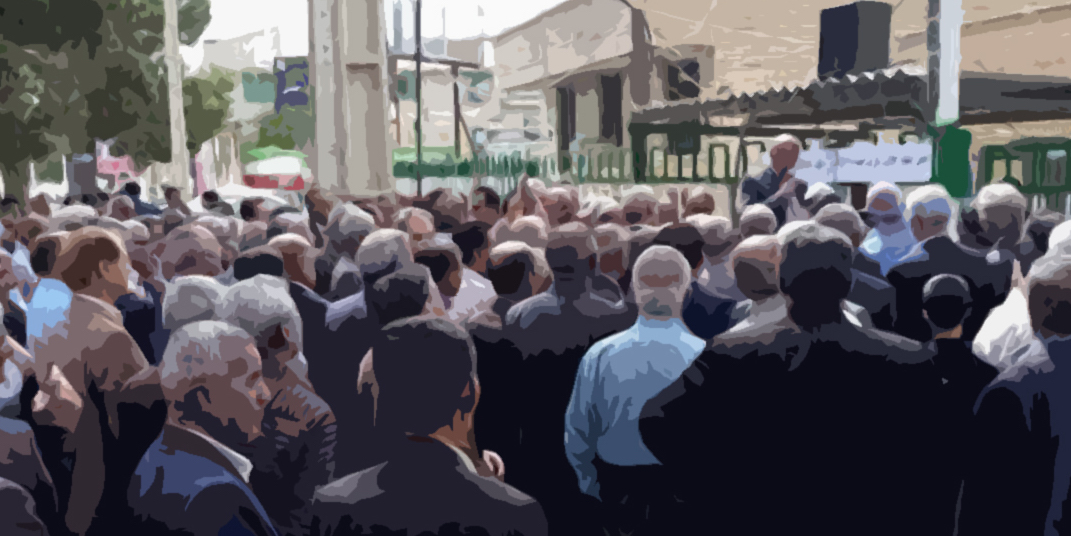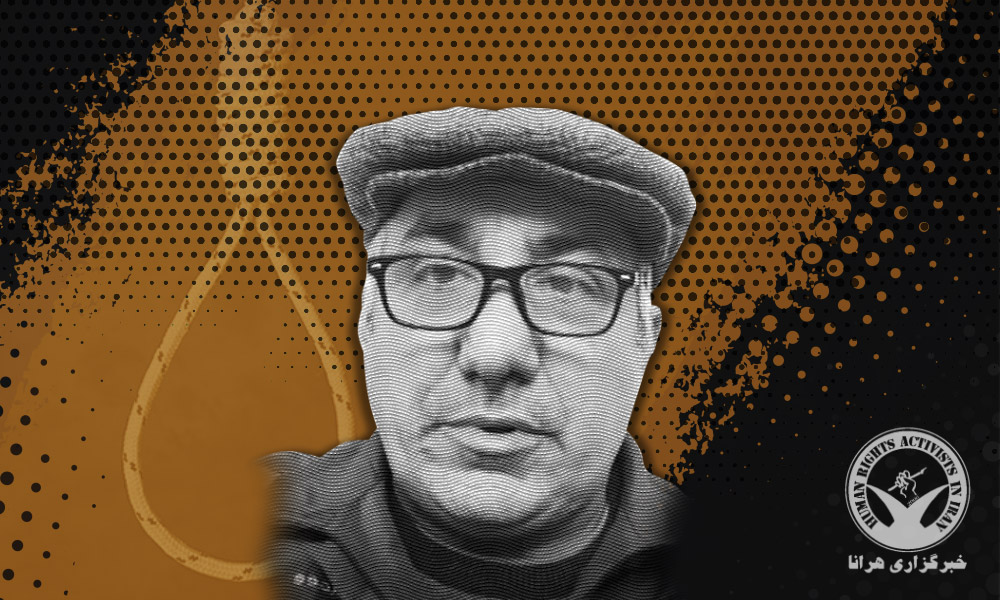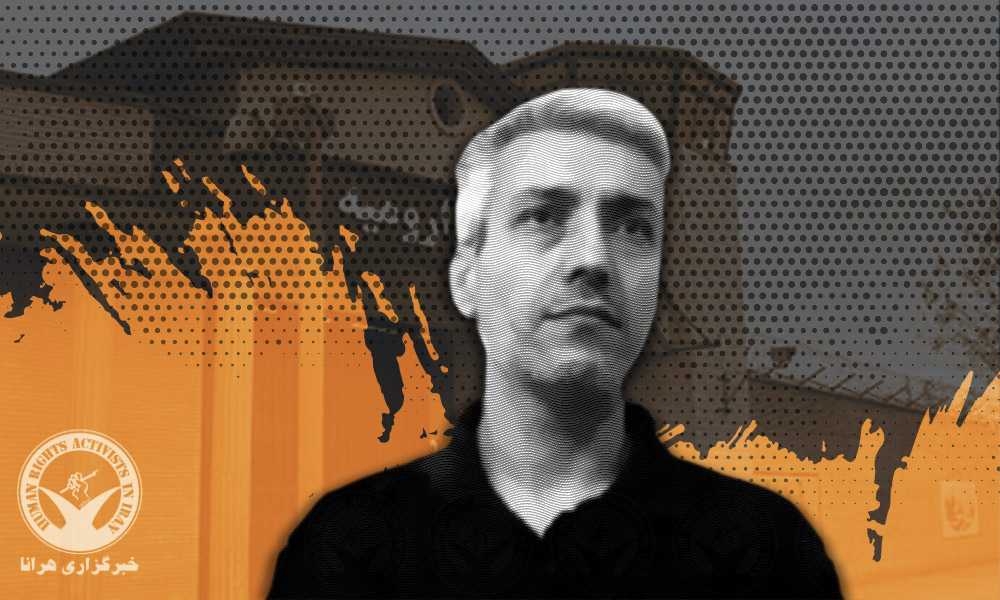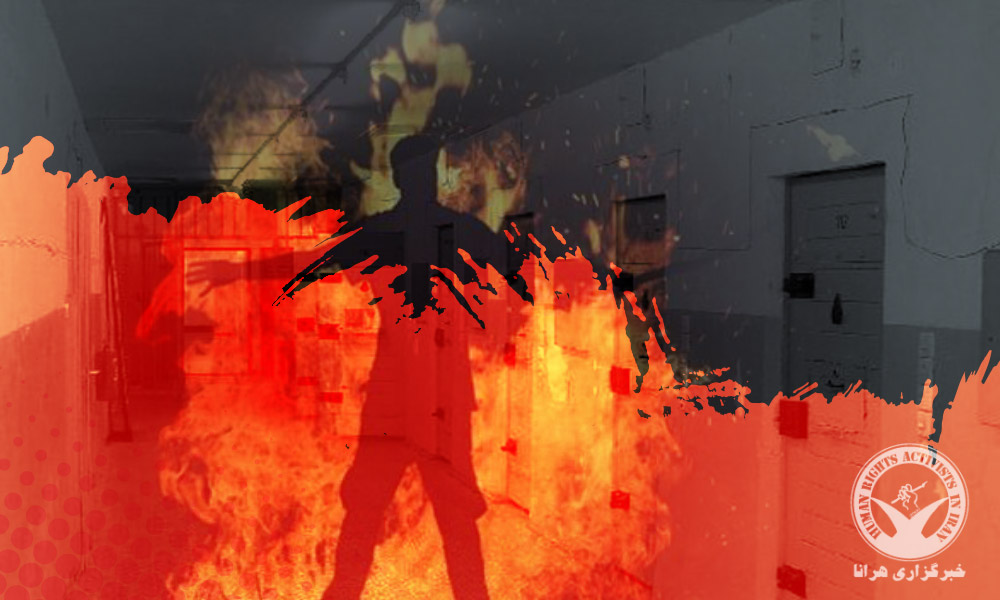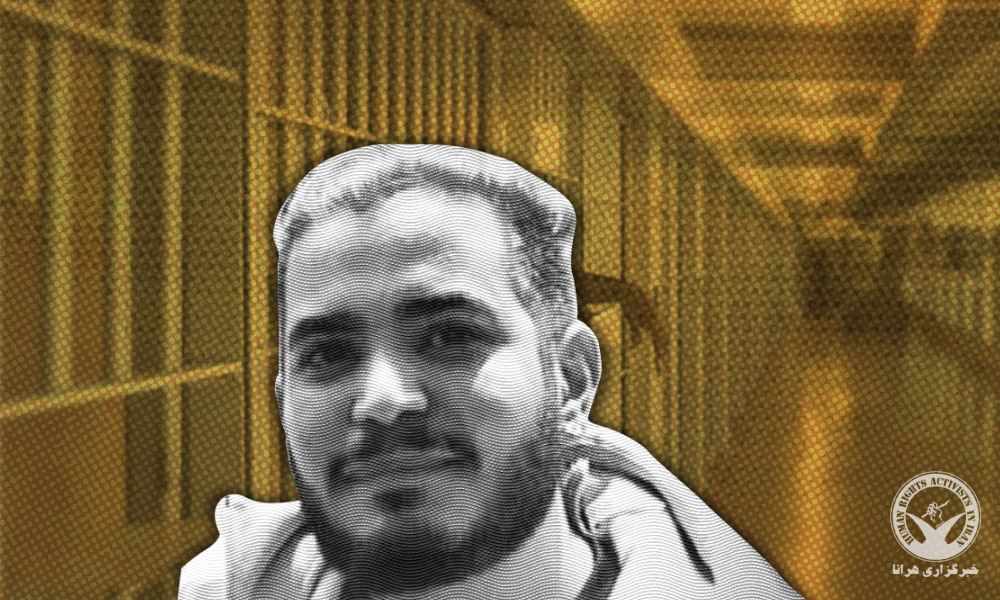According to HRANA, the news agency of Human Rights Activists, a number of protests took place this week in Iran, many of which were continuations of ongoing movements. Read our recap below for details, photos, and videos from the demonstrations.
Saturday, October 30
The workers of Abadan Petrochemical Company assembled at the company premises to demand the right to form an Islamic Workers’ Council, as the labor code allows, the adjustment of their contracts according to their job classification plans, job security, preservation of the dignity of workers and an end to punitive measures towards employees who advocate for their rights.
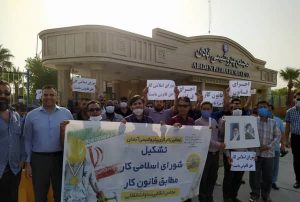
A number of workers of the Golnar Vegetable Oil Factory protested at the company premises. As well as fostering a number of other internal problems, the factory employer reportedly has been announcing temporary business closure each month, and sending about 300 workers on compulsory leave.
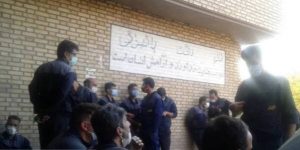
Dozens of teachers and educators from various cities came to Tehran on Saturday and and assembled in front of Parliament. They asked for implementation of the Ranking Income Bill, whereby the salaries of teachers must be raised to at least 80% of university board members’ salaries. They also demanded the fortification of pension funds, in adherence with Civil Service Management Law.
In Bandar Mahshahr, the workers of Razi Petrochemical Company went on strike for several consecutive days. They assembled in front of the company headquarters and demanded bonuses and benefits, improvement in the quality of meals, implementation of the Jobs Classification Plan, and supplementary health insurance.
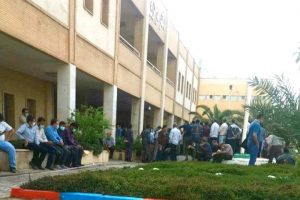
The concierges and service workers of schools assembled in front of Parliament in Tehran and protested poor living conditions and low wages.
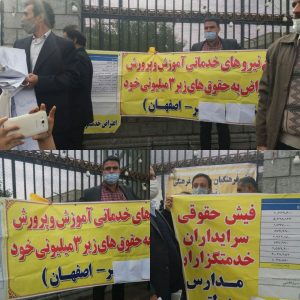
A number of residents of the village Shahr-e Kohneh in Neyshabur County protested infrastructural negligence, particularly in regard to road maintenence. Residents currently have to travel a long distance to reach an unsafe underpass in order to cross the railway.
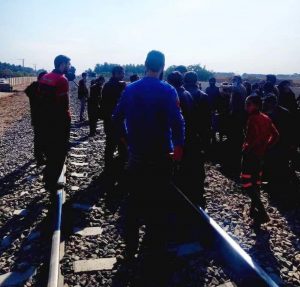
A number of residents of Mahabad City in Isfahan assembled in the dried up stretches of the river Taherabad and protested water withdrawal from this river for the usage of the Fulad Natanz factory. Moreover, reportedly, as a result of this water withdrawal a 3000-year-old Qanat has been dried up.
In Tehran, A number of lawyers of the judiciary assembled in front of the building of the Iran Bar Association to show their opposition to enactment of a plan whereby the issuance of some business licenses will be facilitated.
A group of specialized hospital assistants of Imam Hossein Hospital went on a strike at their workplace in protest against their poor living conditions.

About 40 workers of Kayson Company stopped working and went on a strike to ask for their demands, including the payment of wages that have been delayed by three months.
Sunday, October 31
A number of retirees and pensioners of the Iran Social Security Organization assembled in front of their local units in various cities such as Tehran, Mashhad, Ahvaz, Kermanshah, Rasht and Tabriz. They asked for a pension above the poverty line, implementation of article 96 of the Social Security Acts, closing the disparity in pension incomes, end-year bonuses and factoring in employment history in hazardous jobs when calculating pension income.
Service workers of Tehran Metro on Line 2 assembled to protest the three-month delay in their wages. Moreover, they have not received end of year bonuses for two years and the employer’s insurance contribution has also been delayed.
For a second consecutive day, workers of the vegetable oil factory Golnar assembled at the factory premises to demand action.
“After two days of protests, no one from the company responds to us,” one of these workers stated. “Since the privatization of the factory, in recent years, there have raised many conflicts between the company and the workers including compulsory unpaid leaves, the deduction of leave from the salary, reducing in production, imposing one-month contracts and continuous two-week night work, and the most important, threatening workers to be fired.”
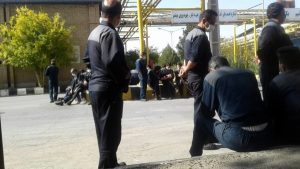
For the second consecutive day, a group of workers of Abadan Petrochemical Company (TAPPICO) assembled at the company premises to ask for the implementation of the Job Classification plan. They also protested against the layoffs of four fellow workers.
In Qazvin, the garden maintenance workers of Rojan Dasht Caspian went on strike to demand their wages, which have been delayed by 4 months.
Workers of Arak Machine Manufacturing Factory assembled and protested at the company premises. They demanded increased wages in accordance with inflation and real living costs.
A group of the retirees of Telecommunication Company of Iran assembled at premises of the building of the finance department of the company to ask for their demands.
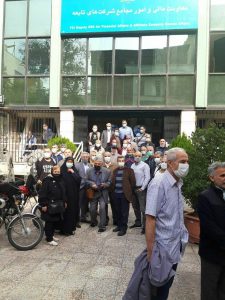
A number of farmers from Shush and Shushtar assembled in front of their government buildings to protest rice exports outside the province.
Monday, November 1
Judiciary personnell assembled in front of the Justice building of various cities across the country including Tehran, Mashhad, Shush, Yazd, Zanjan, Farahan, Ray Shahr, Kuhrang, Neyshabur, Meybod, Gorgan, Azadshahr, Sanandaj, Ahvaz, Elam, Arak, Divandareh, Paveh, Damavand, Kasmar, Tafresh, Boroujen. They protested against poor living conditions and inattention to their demands.
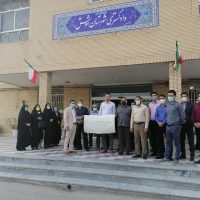
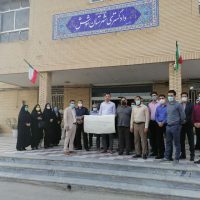
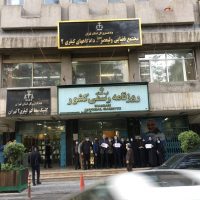
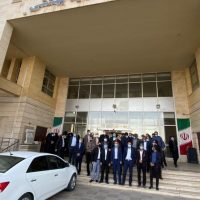
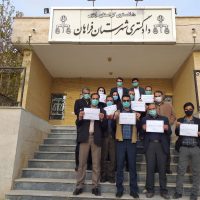
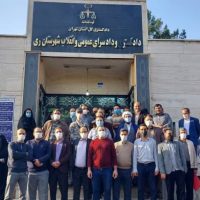
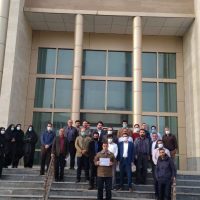
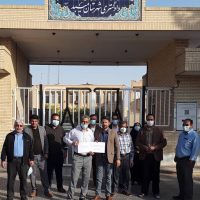
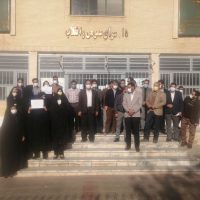
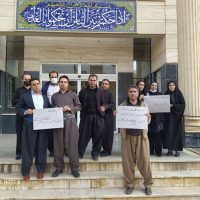
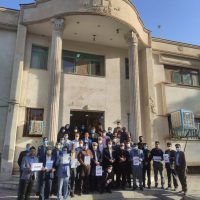
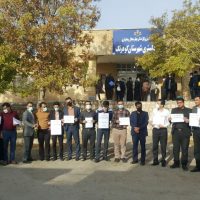
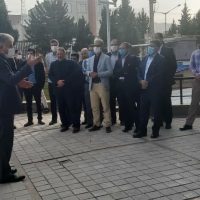
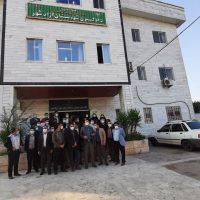
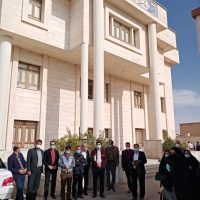
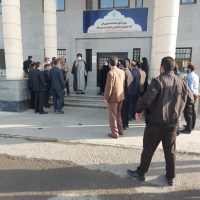
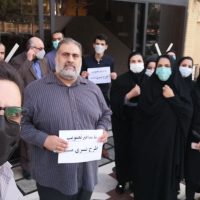
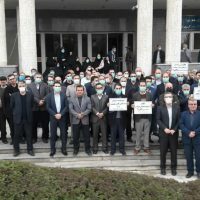
A number of the workers in the lead and zinc mine in Gojar in Kerman Province assembled in front of the building of the Ministry of Cooperatives, Labour and Social welfare in Kerman to demand increased wages.
A number of workers of Kut-e Abdollah Municipality assembled in front of the building of the Islamic Council in this city. They protested unpaid wages and unpaid employers’ contributions to health insurance.
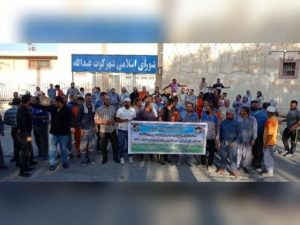
A group of citizens in Tehran assembled in front of the building of the Securities and Exchange Organization to protest capital market collapse and demanded that measures be taken to protect people’s investments.
Workers of the Razi petrochemical company went on a strike at their workplace in Bandar Mahshah. They asked for benefits and bonuses in accordance with workplace conditions, improvment in the quality of meals, implementation of the Job classification plan, and supplementary insurance.
Tuesday, November 2
A group of personnel and board members of Islamic Azad University of Shushtar City assembled on campus to protest unpaid wages.
The residents of the town “Poshte Bagh-e Parandgan” in Astara County assembled in front of the building of the Ministry of Roads and Urban Development office to protest against the decision to demolish a number of local residential complexes.
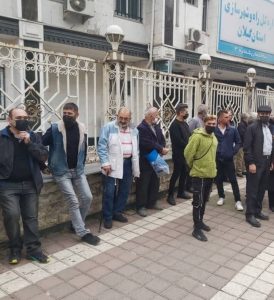
Personnel of the Regional Telecommunication Company of Eastern Azerbaijan Province assembled inside the company headquarters and in front of the management office.
A number of people who have not received their pre-ordered cars from Azvico Company (Azerbaijan Vehicle Industry) assembled in front of the office of the Head of the Judiciary .
Residents of the village Malek-Abad in Arak County protested the unlawful confiscation of their pieces of land by semi-government Awqaf and Charity Affairs Organizations. A few days prior, they had blocked the road from Arak to Qom City as a demonstration of protest.
A group of transport service drivers of the hospital Shahid Mohammadi went on a strike to protest poor living conditions and low wages.
Workers of Arak Machine Manufacturing Factory assembled at the company premises and went on strike.
Wednesday, November 3
Victims of the financial fraud of the cryptocurrency exchange “Cryptoland” assembled in front of the Tehran Courthouse this Wednesday and demanded that their complaints be addressed and their money returned.
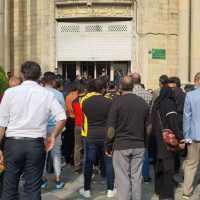
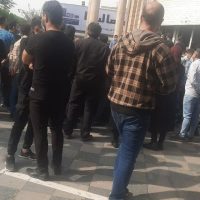
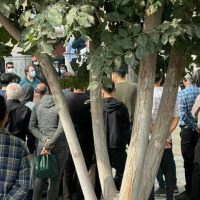
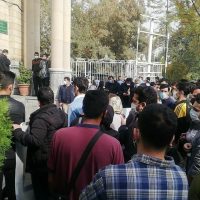
A number of workers of Kut-e Abdollah Municipality assembled in front of the building of the Islamic Council in this city. Reportedly, 400 workers have not been fully paid since July.
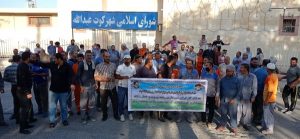
A number of people with hearing impairment in Mariwan assembled in front of the State Welfare Organization building to protest poor living conditions and unemployment. They asked for enforcing the Comprehensive Law on Protection of the Rights of Persons with Disabilities.
A group of shareholders who lost money due to fraudulent transactions in the Tehran stock exchange assembled in front of the Tehran Courthouse in protest.
